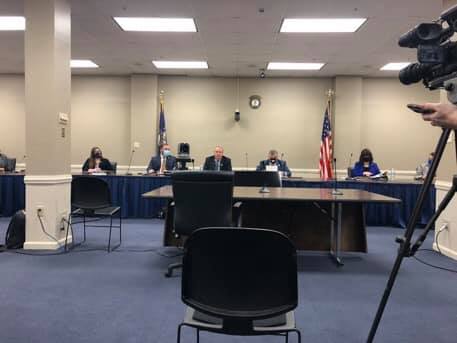
At around 6 pm on January 13, Lexington Herald-Leader reporter Daniel Desrochers tweeted, "The impeachment committee on Gov. Andy Beshear is meeting now and establishing rules."
https://twitter.com/drdesrochers/status/1349484213565861889?s=11
Although the members of the impeachment committee were identified earlier in the week, and committee chairman, Rep. Jason Nemes, stated that the committee's first meeting might occur as early as Wednesday, notice to the public of the virtual "place" and time the meeting would occur was vague to nonexistent.
https://m.huffpost.com/us/entry/us_5fff5020c5b66f3f79639efd/amp
We later learned that the meeting was aired on KET. We initially learned about it through Twitter.
That was our first clue that compliance with the Kentucky Open Meetings Act, "[t]he express purpose [of which] is to maximize notice of public meetings and actions," was not high on the impeachment committee's list of priorities.
Approximately one hour into the meeting, Desrochers tweeted, the chairman announced a closed session.
Seeing this, via Twitter, we asked whether the chairman identified a statutory basis authorizing the closed session.
We received two responses. Both indicated that no statutory authority was cited for the closed session.
Any lingering hope that the impeachment committee would adhere to the requirements of the Open Meetings Act vanished.
It is widely recognized, and to some degree accepted, that the General Assembly operates by its own open meetings playbook — at least when it is not too inconvenient. Those occasions are rare.
While it is legally incontrovertible that the General Assembly is subject to the Open Meetins Act, its standard practice suggests otherwise. Yet it has rarely been legally challenged.
There are a handful of exceptions. Most important, in 2018 the Franklin Circuit Court found that the House of Representatives violated the Open Meetings Act when the full body — with the exception of former Rep. Jim Wayne — met behind closed doors to discuss a report on Matt Bevin's pension reform plan.
In Kentucky House of Representatives v Bluegrass Institute for Public Policy Solutions, the circuit court rejected the House's claim that the closed meeting of the full membership was a Majority Caucus meeting to which the Minority Caucus was invited.
The House's tenuous argument hung on the existence of an exception to the Open Meetings Act — KRS 61.810(1)(i) — authorizing closed sessions of "committees of the General Assembly other than standing committees."
https://apps.legislature.ky.gov/law/statutes/statute.aspx?id=48229
Following two legal challenges to closed caucus meetings in 1994, the General Assembly, by resolutions, expressly created the caucuses as "committees other than standing committees," — or non-standing committees — after which they were legally authorized to conduct closed sessions.
Because a meeting of a political party's caucus necessarily excludes the opposing political party's caucus, the court flatly rejected the House's specious justification for the closed meeting of the full membership in House v BIPPS.
The opinion, which was settled at the appellate level, mirrored a 2017 attorney general's open meetings decision resolving the dispute in favor of BIPPS. Although not "precedential," this authority affirms that the General Assembly and its committees are "not above the open meetings law."
https://ag.ky.gov/Priorities/Government-Transparency/orom/2017/17OMD228…
As we noted in a Tweet issued earlier today, with respect to the impeachment committee:
"We are clearly on unfamiliar legal ground. With the narrow exception of the 2018 Franklin Circuit Court opinion . . . there is little to guide us.
"KRS 61.810(1)(i) permits 'committees of the General Assembly other than standing committees' to conduct closed sessions. The impeachment committee is a non-standing committee.
[On the LRC website link, the impeachment committee is referred to as a "special committee."] https://legislature.ky.gov/Committees/Pages/Committee-Details.aspx?Comm…
A little known statute, KRS 61.815(2), has been interpreted to excuse 'non-standing' committees from observing the requirements for going into closed session. A handful of old Kentucky attorney general advisory opinions state that non-standing committees of the General Assembly are exempt, per se, from the closed session requirements."
https://apps.legislature.ky.gov/law/statutes/statute.aspx?id=23045
The interpretation advanced by the attorney general in these advisory opinions has never been approved by the courts [and is limited to the requirements for going into closed session—other open meetings requirements still apply]."
https://twitter.com/kyopengov/status/1349503922910732290?s=10
In sum, we tweeted:
"What is abundantly clear is that pervasive public mistrust counsels against secrecy here. The impeachment committee should bypass any exception or loophole in the Open Meetings Act and conduct a full, public discussion of the questions before it in the interest of maximizing accountability and ensuring the public's right to know."
Anything less than maximum transparency, in this of all legal contexts, "violates the public good."


